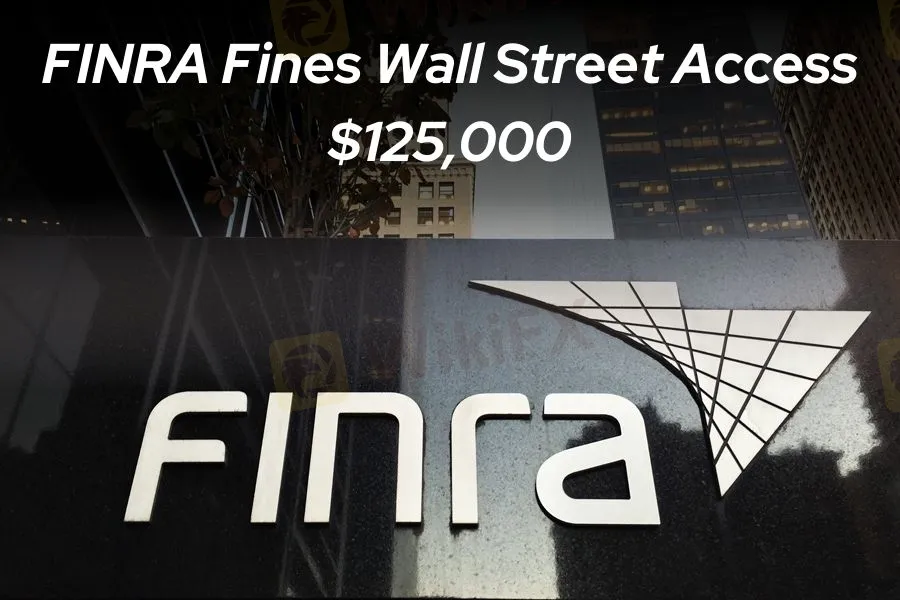简体中文
繁體中文
English
Pусский
日本語
ภาษาไทย
Tiếng Việt
Bahasa Indonesia
Español
हिन्दी
Filippiiniläinen
Français
Deutsch
Português
Türkçe
한국어
العربية
FINRA Fines Wall Street Access $125,000
Abstract:Wall Street Access (WABR) has recently agreed to pay a fine as part of a settlement with FINRA.
Wall Street Access (WABR), a member of the Financial Industry Regulatory Authority (FINRA) since 1981, has recently agreed to pay a fine as part of a settlement with FINRA.

Between October 2019 and April 2021, Wall Street Access violated Rule 611(c) of Regulation National Market System (NMS) and FINRA Rule 2010. The firm failed to take reasonable steps to ensure that the ISOs it routed to certain market centers met the regulatory requirements for such orders. ISOs are designed to allow traders to execute transactions across multiple trading venues while bypassing certain price protection rules, making them a critical tool for maintaining market efficiency. However, improper handling of ISOs can lead to trade-throughs, which occur when a trade is executed at a price worse than the best available price.

In addition to ISO-related violations, Wall Street Access failed to establish and maintain an adequate supervisory system, including written supervisory procedures (WSPs), as required by Rule 611(a) of Regulation NMS and FINRA Rules 3110 and 2010. A robust supervisory system is crucial for preventing regulatory breaches, particularly in high-stakes trading environments. The firms shortcomings in this area not only exposed it to regulatory risk but also highlighted systemic weaknesses in its compliance infrastructure.

To resolve the matter, Wall Street Access agreed to a settlement that includes a censure and a $125,000 fine. Of this amount, $24,563.18 will be paid to FINRA, while the remaining balance will be distributed among various market centers, including the Cboe BYX Exchange, Cboe BZX Exchange, Cboe EDGA Exchange, Cboe EDGX Exchange, Investors Exchange, New York Stock Exchange LLC, NYSE Arca, and NYSE American LLC. This financial penalty serves as a reminder of the significant costs associated with regulatory non-compliance.
Disclaimer:
The views in this article only represent the author's personal views, and do not constitute investment advice on this platform. This platform does not guarantee the accuracy, completeness and timeliness of the information in the article, and will not be liable for any loss caused by the use of or reliance on the information in the article.
Read more

BaFin Halts USDe Token Issuance, Citing Serious Compliance Failures
The German regulator BaFin has frozen USDe token issuance amid compliance issues. What led to this drastic move, and how does it impact the market?

IMF Adds Bitcoin and Digital Assets to Global Economic Statistics for the First Time
IMF’s inclusion of digital assets in economic statistics redefines how nations track and assess the crypto market’s impact.

Big News, Big Moves: Should You Trade During Major Announcements?
Whether it’s central bank decisions, economic data releases, or geopolitical developments, such major events can trigger extreme price swings within seconds. For traders, the temptation to capitalise on these moves is undeniable. But is it a wise strategy, or does it carry unnecessary risk?

Want to Improve Your Forex Trading Success Rate? Get to Know the Five Key Players in the FX Market!
This article delves into the primary participants of this colossal market, including importers and exporters, Forex brokers, commercial banks, central banks, and speculators. By understanding the roles of these key players, traders can better navigate the Forex landscape.
WikiFX Broker
Latest News
Enlighten Securities Penalized $5 Million as SFC Uncovers Risk Control Failures
Why Are Financial Firms Adopting Stablecoins to Enhance Services and Stability?
Experienced Forex Traders Usually Do This Before Making a Lot of Money
Octa vs XM:Face-Off: A Detailed Comparison
When High Returns Go Wrong: How a Finance Manager Lost RM364,000
Bridging Trust, Exploring Best—WikiEXPO Hong Kong 2025 Wraps Up Spectacularly
Unlocking the Power of Algo Trading: Benefits and Limitation
Rise of Fake Trading Apps & Their Impact on Investors
Crypto-to-Cash Transfers Now Available for UK and Europe
U.S. and Japan Interest Rates Hit Recent Highs – Watch Out for Short Sellers
Currency Calculator







